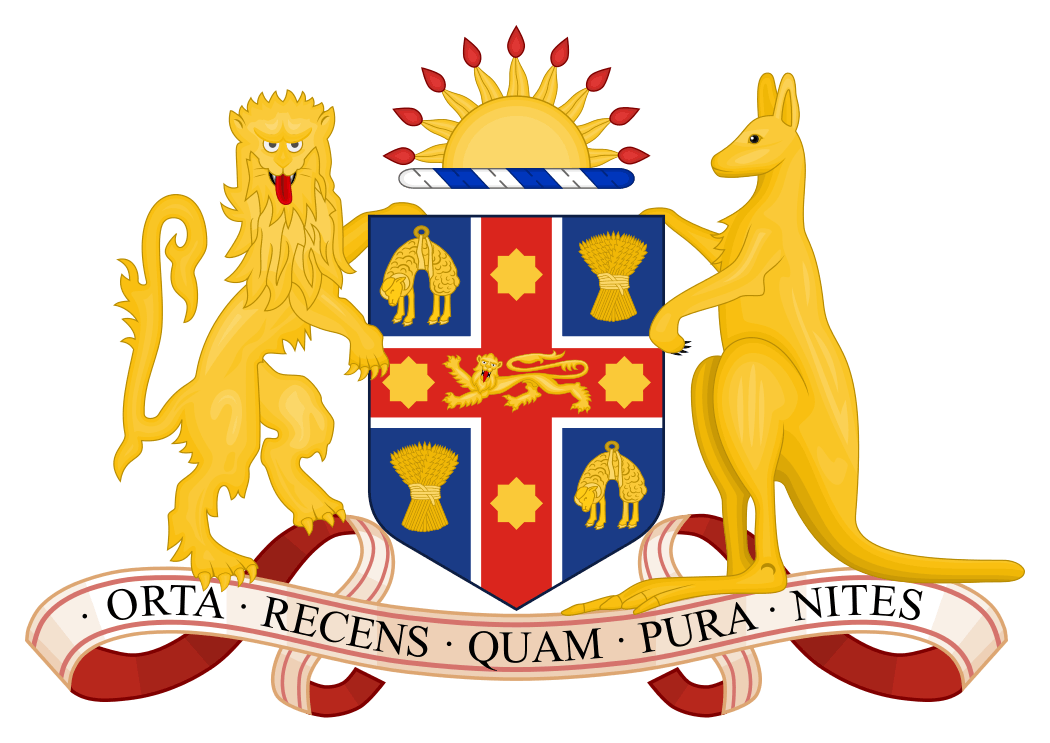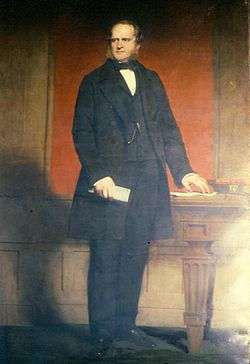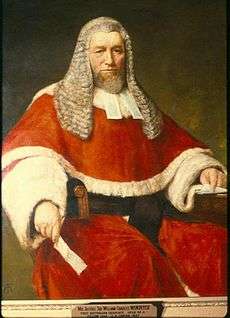Attorney General of New South Wales
| Attorney General of New South Wales | |
|---|---|
 | |
| Department of Justice | |
| Style | The Honourable |
| Nominator | Premier of New South Wales |
| Appointer | Governor of New South Wales |
| Inaugural holder | Saxe Bannister |
| Formation | 14 April 1824 |
| Deputy | Solicitor General |
| Website | NSW Department of Justice |
The Attorney General of New South Wales, in formal contexts also Attorney-General or Attorney General for New South Wales[1] and usually known simply as the Attorney General, is one of the Law Officers of the Crown. Along with the subordinate Solicitor General, Crown Advocate, and Crown Solicitor, the Attorney General serves as the chief legal and constitutional adviser of the Crown and its government in the Australian state of New South Wales.
The current Attorney General, since 2 April 2015, is Gabrielle Upton, MP, a representative of the Liberal Party of Australia (NSW Division).[2] The Attorney General administers their portfolio through the Department of Justice, which is headed by the Minister for Justice and Police, Troy Grant.[2]
History and function






.jpg)
The position of Attorney General has existed since 1824, well before the full establishment of the New South Wales Parliament (in 1856) but coinciding with the establishment of the New South Wales Legislative Council. From the beginning, the Attorney General has been the Crown's advisor and representative in legal matters. It was modelled after the office of the Attorney General for England and Wales. As such the Attorney General advises and represents the Crown and government departments in court. The person appointed to this role provides legal advice to the Government, acts as the representative of the public interest and resolves issues between government departments.
The Attorney General also has supervisory powers over the prosecution of criminal offences, but is not personally involved with prosecutions. Today prosecutions are carried out by the Public Prosecution Office and most legal advice to government departments is provided by the Government Legal Service, both under the supervision of the Attorney General. The Attorney General may appeal cases to the higher courts where, although the particular case is settled, there may be a point of law of public importance at issue. The Attorney General is responsible to Parliament for activities of the Department of Justice and has responsibility for the all state's courts and tribunals and the appointment of judges, magistrates and statutory officers in New South Wales.
List of Attorneys General
| Ordinal | Attorney General[3] | Party affiliation | Period |
|---|---|---|---|
| 1 | Saxe Bannister | No party | 14 April 1824 – 13 October 1826 |
| 2 | William Moore (acting) | 13 October 1826 – 31 July 1827 | |
| 3 | Alexander Baxter | 1 August 1827 – 24 January 1831 | |
| – | William Moore (acting) | 24 January 1831 – 24 June 1831 | |
| 4 | John Kinchela | 25 June 1831 – 18 April 1836 | |
| 5 | John Plunkett | 17 September 1836 – 5 June 1856 | |
| 6 | William Manning | 6 June 1856 – 25 August 1856 | |
| 7 | James Martin | 26 August 1856 – 2 October 1856 | |
| – | William Manning | 3 October 1856 – 25 May 1857 | |
| 8 | John Darvall | 26 May 1857 – 7 September 1857 | |
| – | James Martin | 7 September 1857 – 8 November 1858 | |
| 9 | Alfred Lutwyche | 15 November 1858 – 21 February 1859 | |
| 10 | Lyttleton Bayley | 21 February 1859 – 26 October 1859 | |
| 11 | Edward Wise | 27 October 1859 – 13 February 1860 | |
| – | William Manning | 21 February 1860 – 8 March 1860 | |
| 12 | John Hargrave | 2 April 1860 – 31 July 1863 | |
| – | John Darvall | 1 August 1863 – 15 October 1863 | |
| – | James Martin | 16 October 1863 – 2 February 1865 | |
| – | John Darvall | 3 February 1865 – 20 June 1865 | |
| – | John Plunkett | 25 August 1865 – 21 January 1866 | |
| – | James Martin | 22 January 1866 – 26 October 1868 | |
| – | William Manning | 21 October 1868 – 15 December 1870 | |
| – | James Martin | 16 December 1870 – 13 May 1872 | |
| 13 | Edward Butler | 15 May 1872 – 10 November 1873 | |
| 14 | Joseph Innes | 20 November 1873 – 8 February 1875 | |
| 15 | William Bede Dalley | 9 February 1875 – 21 March 1877 | |
| 16 | William Charles Windeyer | 22 March 1877 – 16 August 1877 | |
| – | William Bede Dalley | 17 August 1877 – 17 December 1877 | |
| 17 | William Foster | 18 December 1877 – 20 December 1878 | |
| – | William Charles Windeyer | 21 December 1878 – 10 August 1879 | |
| 18 | Robert Wisdom | 13 August 1879 – 4 January 1883 | |
| – | William Bede Dalley | 5 January 1883 – 6 October 1885 | |
| 19 | John Henry Want | 7 October 1885 – 21 December 1885 | |
| 20 | George Bowen Simpson | 22 December 1885 – 25 February 1886 | |
| – | John Henry Want | 26 February 1886 – 19 January 1887 | |
| – | William Foster | Free Trade | 20 January 1887 – 18 May 1887 |
| 20 | Bernhard Wise | 27 May 1887 – 7 February 1888 | |
| – | George Bowen Simpson | 10 February 1888 – 16 January 1889 | |
| 21 | Edmund Barton | Protectionist | 17 January 1889 – 7 March 1889 |
| – | George Bowen Simpson | Free Trade | 8 March 1889 – 22 October 1891 |
| – | Edmund Barton | Protectionist | 23 October 1891 – 14 December 1893 |
| 22 | Charles Heydon | 15 December 1893 – 2 August 1894 | |
| – | George Bowen Simpson | Free Trade | 3 August 1894 – 1 December 1894 |
| – | John Henry Want | 18 December 1894 – 18 April 1899 | |
| 23 | George Reid | 19 April 1899 – 13 September 1899 | |
| – | Bernhard Wise | Protectionist | 14 September 1899 – 14 June 1904 |
| 24 | James Gannon | Progressive | 15 June 1904 – 29 August 1904 |
| 25 | Charles Wade | Liberal Reform | 29 August 1904 – 20 October 1910 |
| 26 | William Holman | Labor | 21 October 1910 – 29 January 1914 |
| 27 | David Hall | 29 January 1914 – 15 November 1916 | |
| Nationalist | 15 November 1916 – 23 July 1919 | ||
| 28 | John Garland | 23 July 1919 – 12 April 1920 | |
| 29 | Edward McTiernan | Labor | 12 April 1920 – 20 December 1921 |
| 30 | Thomas Bavin | Nationalist | 20 December 1921 |
| – | Edward McTiernan | Labor | 20 December 1921 – 13 April 1922 |
| – | Thomas Bavin | Nationalist | 13 April 1922 – 17 June 1925 |
| – | Edward McTiernan | Labor | 17 June 1925 – 26 May 1927 |
| 31 | Andrew Lysaght | 27 May 1927 – 18 October 1927 | |
| 32 | Francis Boyce | Nationalist | 18 October 1927 – 3 November 1930 |
| – | Andrew Lysaght | Labor | 4 November 1930 – 16 June 1931 |
| 33 | Joseph Lamaro | 16 June 1931 – 15 October 1931 | |
| Labor (NSW) | 15 October 1931 – 13 May 1932 | ||
| 34 | Daniel Levy | United Australia | 16 May 1932 – 17 June 1932 |
| 35 | Henry Manning | 18 June 1932 – 16 May 1941 | |
| 36 | Clarrie Martin | Labor | 16 May 1941 – 23 February 1953 |
| 37 | Bill Sheahan | 23 February 1953 – 15 March 1956 | |
| 38 | Reg Downing | 15 March 1956 – 13 May 1965 | |
| 39 | Ken McCaw | Liberal | 13 May 1965 – 3 January 1975 |
| 40 | John Maddison | 3 January 1975 – 14 May 1976 | |
| 41 | Frank Walker | Labor | 14 May 1976 – 1 February 1983 |
| 42 | Paul Landa | 1 February 1983 – 24 November 1984 | |
| 43 | Neville Wran | 27 November 1984 – 12 December 1984 | |
| 44 | Terry Sheahan | 12 December 1984 – 26 November 1987 | |
| 45 | Ron Mulock | 26 November 1987 – 21 March 1988 | |
| 46 | John Dowd | Liberal | 25 March 1988 – 6 June 1991 |
| 47 | Peter Collins | 6 June 1991 – 3 July 1992 | |
| 48 | John Hannaford | 3 July 1992 – 4 April 1995 | |
| 49 | Jeff Shaw | Labor | 4 April 1995 – 28 June 2000 |
| 50 | Bob Debus | 28 June 2000 – 2 April 2007 | |
| 51 | John Hatzistergos | 2 April 2007 – 28 March 2011 | |
| 52 | Greg Smith | Liberal | 3 April 2011 – 23 April 2014 |
| 53 | Brad Hazzard | 23 April 2014 – 2 April 2015 | |
| 54 | Gabrielle Upton | 2 April 2015 – present |
References
- ↑ See, e.g. Leahy v Attorney-General for New South Wales and Makin v Attorney General for New South Wales
- 1 2 Hasham, Nicole (3 April 2015). "Premier Mike Baird's new NSW cabinet sworn in: Gladys Berejiklian and Gabrielle Upton first female Treasurer and Attorney-General". The Sydney Morning Herald. Retrieved 6 April 2015.
- ↑ O'Neill, Patrick. "New South Wales Attorneys-General 1823+". List of Australian Attorneys-General. Parliament of Australia. Retrieved 15 September 2015.